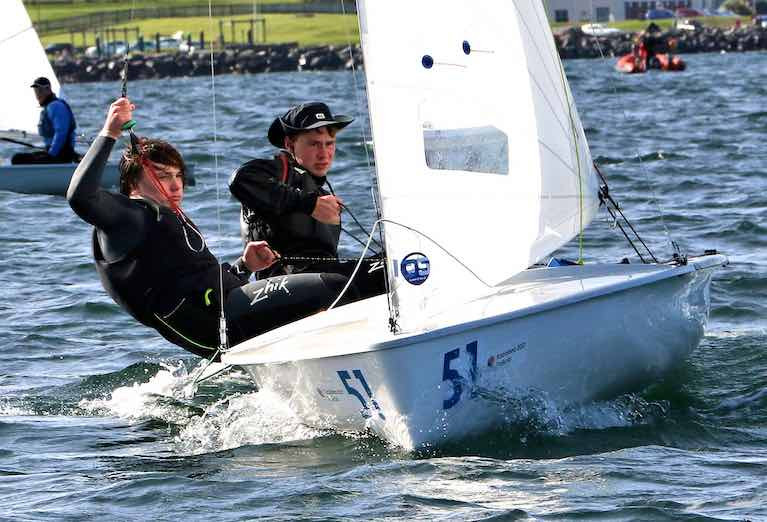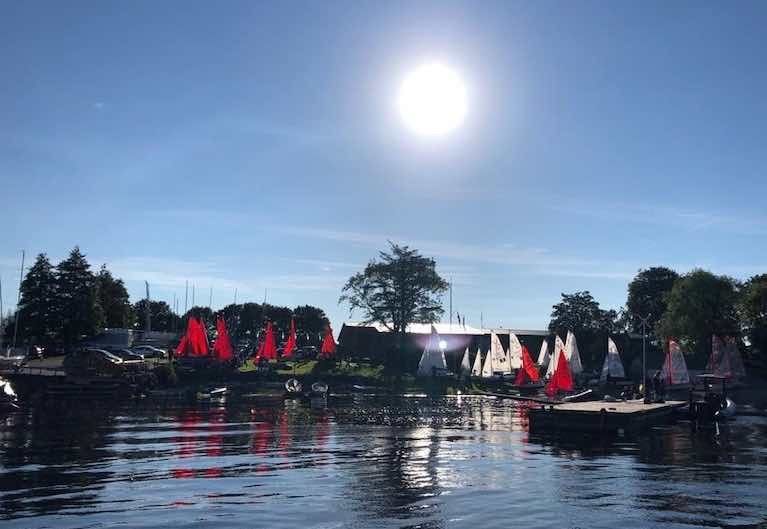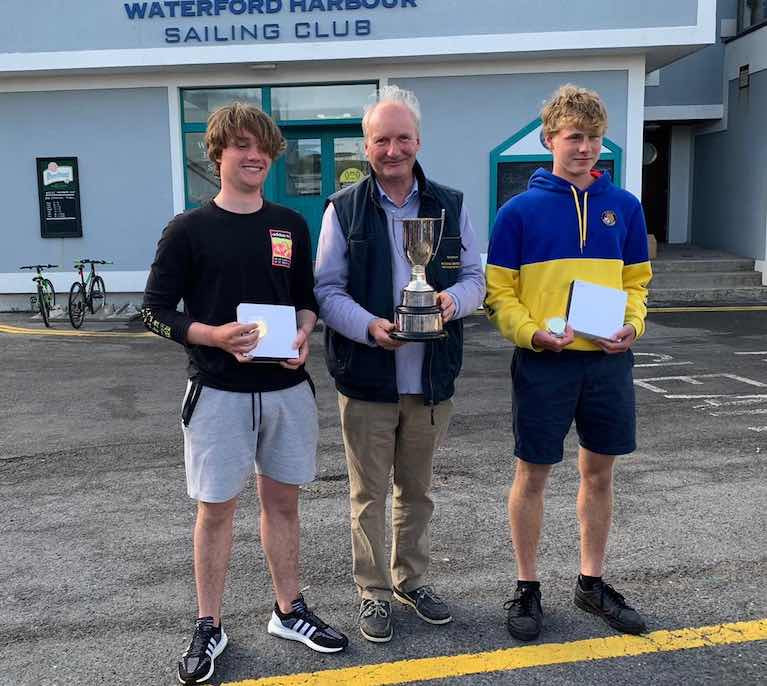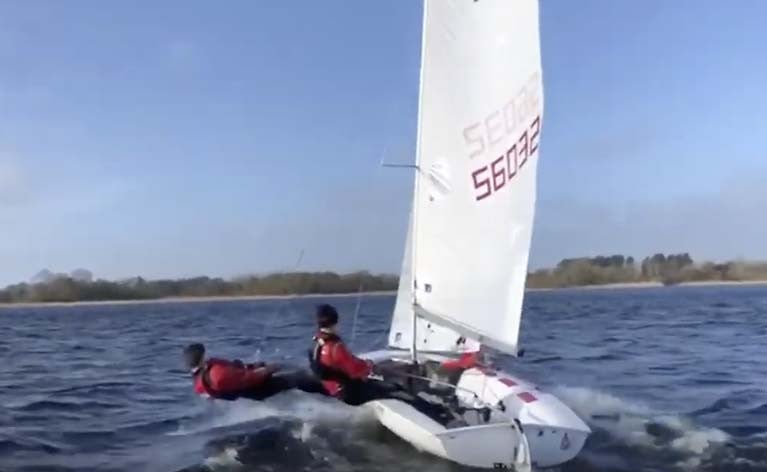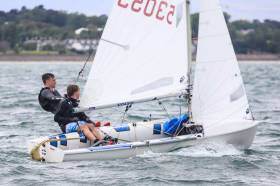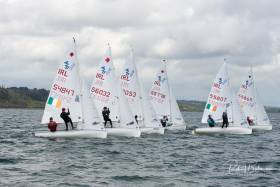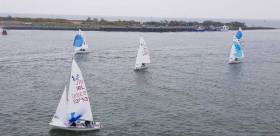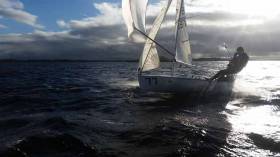Displaying items by tag: 420
This weekend saw the much-anticipated return to racing for two youth sailing fleets; the Mirror & 420 fleets. This joint event held at Lough Ree Yacht Club, was a Mirror Regional Championship and a 420 "Warm Up" Regatta.
The first 420 Regional is scheduled for the 26th & 27th of this month at Waterford Harbour Sailing Club, giving time for the Leaving Cert Sailors.
Nineteen boats competed, ten Mirrors and nine 420's and the conditions were sublime! Breeze on Saturday was fresh at times, enabling the 420's planing upwind. Lake sailing without sea swell offers dinghy Sailors a different experience however, when light conditions prevail, local knowledge can be useful! Race Officer Garrett Leech got 6 races in over the course of the weekend.
 The start of a Lough Ree Yacht Club Mirror dinghy race
The start of a Lough Ree Yacht Club Mirror dinghy race
In the Mirror Fleet, the Championship was dominated by Sligo Sister & Brother team, Jessica & Mark Greer who got bullets in 5 out of the 6 races. Second place overall again went to Sligo Sailors, Mia Canham & William Draper, and third overall went to Blessington Sailors; Jack McNaughton & Saoirse Lawley. A big shout out to local sailors (and first time racing!); Mathew Turner & Donnacha Dullea, who finished fourth overall and first in Bronze Fleet.
In the 420s, the "Warm Up" regatta was dominated by Jack McDowell (Malahide Yacht Club) & Harry Thompson (Wexford Harbour Boat & Tennis Club), who like their Mirror counterparts, won 5 bullets out of the 6 races. Second & third places overall went to local duo's; Eoghan Duffy & Luke Johnston and Alex Leech & Conor Paul, respectively.
Two of the competing 420 Teams will be travelling to Yacht Club San Remo in Italy for the 420 World Championship, which starts at the beginning of July and runs for almost two weeks. These teams are McDowell/Thompson & Hauer/Micka.

Ben Graf is September's (Junior) Sailor of the Month
Teenage skipper Ben Graf of the 250-year-old Lough Ree YC is September's Junior "Sailor of the Month" on the strength of a remarkably varied lineup of successes which reached a new level during the late season. Having won the 420 Nationals at Dunmore East crewed by Alexander Farrell, he repeated the performance of gaining top slot at the 420 Northerns at Ballyholme, and then immediately transferred back to Lough Ree for another bout of successful helming in the SB20 Class.
He has also figured in Shannon One Design racing, and in a new departure for 2020, he and Farrell made their impressive debut in the Fireball Class in anticipation of the Worlds in Ireland in 2021.
Tight Battles at 420 Dinghy Connaught Championships at Lough Ree Yacht Club
Following hot on the heels of the Irish 420 National Championships held in Dunmore East the Connaught Championships were held last weekend at Lough Ree Yacht Club as part of the clubs Double Ree regatta celebrating double-handed youth sailing. The adrenalin rush of the open seas and big waves was replaced with two contrasting days of excellent lake sailing. Home advantage lay with the Lough Ree Yacht Club crews who had claimed both the Gold and Silver fleet honours at the nationals with some dominant displays. But this event featured contrasting results to the National Championships where Graf/Farrell previously had such a dominant display, Lough Ree, in contrast, produced five different race winners across the six-race starts.
 2020 Connaught Championships - Winners of Gold Fleet - Jack McDowell of Malahide Yacht Club and Harry Thompson of Wexford Harbour Sailing Club
2020 Connaught Championships - Winners of Gold Fleet - Jack McDowell of Malahide Yacht Club and Harry Thompson of Wexford Harbour Sailing Club
 2nd place Gold Fleet - Ben Graf and Alexander Farrell of Lough Ree Yacht Club
2nd place Gold Fleet - Ben Graf and Alexander Farrell of Lough Ree Yacht Club
 3rd place Gold Fleet - Harry Shackelton and Cara McDowell of Malahide Yacht Club
3rd place Gold Fleet - Harry Shackelton and Cara McDowell of Malahide Yacht Club
Saturday delivered a moderate breeze with winds strength ranging from the low teens into the low twenties blowing down the length of the lake from the north. The choppy lake waves provided a new challenge in contrast to the rollers at Dunmore east the previous week. The Race Officer David Dickson was able to run three excellent races before calling a halt to proceedings with Graf/Farrell holding a one-point lead over Rickard/Pank who held a further two-point lead over McDowell/Thompson in third. Each crew had one race win with the leader board looking like a game of snakes and ladders through the day, but Graf/Alexander were the more consistent crew on the day allowing them to hold the overnight lead.
Sunday dawned with clear blue skies and not a breath of wind as the sailors prepared for an early start. A light lake breeze soon settled in time for racing to commence. The light shifty breeze give the sailors plenty to think and the first race on day two went to McDowell/Thompson parachuting them into the lead temporarily. The next two races say two new race winners with race five won by a country mile by Leech/Paul and race six won by Shackelton/McDowell. Leader positions in both fleets changed frequently but the more consistent performance of Graf/Farrell and McDowell/Thompson saw both crews etch out a small advantage over the rest of the fleet. The pair were separated by half a boat length at the finish of race five handing the advantage to the Graf/Farrell crew heading into the last race. Shackelton/McDowell took the early lead of race 6 with Graf/Farrell tucked in with the leading boats and McDowell/Thompson trailing in 7th place. Steady improvements up the fleet during the race say McDowell/Thompson reach the top of the final beat just behind Graf/Farrell who had the misfortune to get a twist in their spinnaker in the reach across the top of the trapezoid course. With the spinnaker problems ironed out a game of cat and mouse began down the final leg towards the leeward mark before the final turn for home and a reach to the finish where the winners crossed the finish line a sweaty palm one boat length ahead of the Graf/Farrell team. The winning crew of McDowell/Thompson got the title on a tie break with a score of 10pts. Positions three to five were separated by only one point with Shackelton/McDowell in third on 16pts and Richard/Pank plus Leech/Paul both on 17pts.
The podium for the silver fleet saw new names stepping up to take first and third-place positions. McMullan/Smyth took the title with McGrady/O’Sullivan in third and second place again going to Hauer/Micka as they did in the nationals the previous week.
 Winners of Silver Fleet - Sam McMullan and Daniel Smyth of Lough Ree Yacht Club
Winners of Silver Fleet - Sam McMullan and Daniel Smyth of Lough Ree Yacht Club
 2nd place Silver Fleet - Imogen Hauer and Hugo Micka of Malahide Yacht Club
2nd place Silver Fleet - Imogen Hauer and Hugo Micka of Malahide Yacht Club
 3rd place Silver Fleet - Adam McGrady and Aly O'Sullivan of Galway Bay Sailing Club
3rd place Silver Fleet - Adam McGrady and Aly O'Sullivan of Galway Bay Sailing Club
Gold fleet
1st Place Gold Fleet – Jack McDowell, Malahide Yacht Club & Harry Thompson, Wexford Harbour Boat and Tennis Club.
2nd Place Gold Fleet – Ben Graf & Alexander Farrell, Lough Ree Yacht Club
3rd Place Gold Fleet– Harry Shackelton and Cara McDowell, Malahide Yacht Club
Silver fleet
1st Place Silver Fleet – Sam McMullan & Daniel Smyth, Lough Ree Yacht Club
2nd Place Silver Fleet – Imogen Hauer & Hugo Micka, Malahide Yacht Club
3rd Place Silver Fleet – Adam McGrady & Ally O’Sullivan, Galway Bay Sailing Club
The Irish 420 Sailing Championships for 2020 were hosted by Waterford Harbour Sailing Club in Dunmore East last weekend with sponsorship by McConnell’s Toyota Waterford. Storm Ellen provided lively weather conditions on Friday with the Race Officer Michael Tyrrell not having to dwell too long on the decision to cancel racing for the day.
Saturday dawned with a very strong breeze and a swell in excess of four meters at times. And whilst many of the sailors may have been salivating in expectation of surfing the waves, the practicalities of trying to get marks and the committee boat to remain in one place long enough to hold a race, plus providing safety for a full fleet on the water led to a decision to cancel racing during the afternoon.
 2nd Place Gold- Jack McDowell Malahide Yacht Club and Harry Thompson Wexford Harbour Boat and Tennis Club
2nd Place Gold- Jack McDowell Malahide Yacht Club and Harry Thompson Wexford Harbour Boat and Tennis Club
Sunday provided a moderation in both the breeze strength and wave heights. But with wind speeds of 15-22knots and a swell of two metres, there was plenty to entertain in the four races run. The conditions provided a stern test for this, the first competitive event of the year, and sailors pushed their boats hard with the occasional gear failure forcing some retirements. The committee boat did not escape without incident either as it parted company with its anchor after the second race leading to short delay in proceedings.
 3rd Place Gold and first placed girls - Isabella Irwin and Olivia Cure Galway Bay Sailing Club
3rd Place Gold and first placed girls - Isabella Irwin and Olivia Cure Galway Bay Sailing Club
The Graf/Farrell combination excelled in the lively conditions with excellent upwind speed in particular that provided them with a convincing win in the first race. And whilst the next 3 races were much closer affairs the pair took 4 bullets in total to take the 2020 title and the gold medal. The remaining podium positions were hotly contested with the new Leech/Paul combination in the silver fleet pushing McDowell/Thompson hard for the silver medal position and in the end settling for third position overall and the bronze medal. Another silver fleet new combination of Hauer/Micka took fourth place and they were followed by the first ladies team of Irwin/Cure in fifth. The local team of Passberger/Maree finished sixth in their first competitive 420 event.
 1st Place Silver - Alex Leech and Conor Paul Lough Ree Yacht Club
1st Place Silver - Alex Leech and Conor Paul Lough Ree Yacht Club
The race committee and all the volunteers at Waterford Harbour Sailing Club worked hard to manage both the difficult conditions of Storm Ellen and its aftermath, as well as Covid19 procedures. The sunny south eastern weather assisted greatly in keeping faces smiling throughout the weekend. Sailors were able to head home exhausted, but happy after over seven hours at sea. They now look forward to the Connaught Championships to be held at Lough Ree Yacht Club next weekend as part of the Double Ree Regatta where waves are guaranteed to be smaller.
 2nd Place Silver - Imogen Hauer and Hugo Micka Malahide Yacht Club
2nd Place Silver - Imogen Hauer and Hugo Micka Malahide Yacht Club
 3rd Place Silver - Max Passberger and Jack Maree Waterford Harbour Sailing Club
3rd Place Silver - Max Passberger and Jack Maree Waterford Harbour Sailing Club
The fleet placings were as follows:
420 2020 Irish Championships
1st Place Gold Fleet – Ben Graf & Alexander Farrell, Lough Ree Yacht Club
2nd Place Gold Fleet – Jack McDowell, Malahide Yacht Club & Harry Thompson, Wexford Harbour Boat & Tennis Club
3rd Place Gold Fleet and first ladies – Isabella Irwin & Olivia Cure, Galway Bay Sailing Club
1st Place Silver Fleet – Alex Leech & Conor Paul, Lough Ree Yacht Club
2nd Place Silver Fleet – Imogen Hauer & Hugo Micka, Malahide Yacht Club
3rd Place Silver Fleet – Max Passberger & Jack Maree, Waterford Harbour Sailing Club
420 Sailors Brave 30-Knots at Lough Ree Yacht Club (Video)
Lough Ree Yacht Club junior sailors were out in force this morning with gusts of up to 30-knots writes Garret Leech.
Note the fine wipeout at 40 seconds into the video below! No children were harmed during the making of this film!
Meanwhile, the adults cowered ashore whispering words of advice into their coffee! The juniors are getting in some practice ahead of the Schull Winter Training and Munster Championships which is run by the Irish International 420 Class Association, this has become an annual pilgrimage for both Parents & Children.
The Club has a vibrant junior scene and has defined an affordable pathway of their own for youth sailing which they strongly advise parents to adhere to, affordability is key to keeping the kids sailing.
Children can either start in Optimist or Mirror and as they advance their skills, they either move to 420 or Laser, sometimes both.
The club has a strong association with double-handed boats which helps keep youth sailing strong post Optimist.
2020 is Lough Ree Yacht Club’s 250th Anniversary and to celebrate junior sailing at the Club, they will again run the successful Double Ree regatta during the weekend of 18th -19th July.
This regatta will host racing for 420s, 29ers, Mirrors and RS Feva and last time run it was dubbed the Electric Picnic of sailing!
Dublin Bay produced almost perfect weather for the '420 Week' which formed part of the Volvo Dun Laoghaire Regatta. Three days of training preceded the 2019 Irish 420 National Championships where the pre-event weather predictions did not make great reading with low winds predicted for the week.
However, as the week progressed the wind speed increased as did the number of hours of sunshine per day. Only the final race in the series was eventually lost to the weather. The fading breeze and the time limit for the start of the final race simply added to the tension of the final day which started with the first and second-placed boats tied on points and only separated by countback.
The title was decided in Race 7, and what turned out to be the final race of the series, on Sunday morning and won on the final beat of the race as Lucy Kane and Emma Gallagher worked their way back up the fleet to eventually catch Morgan Lyttle and Patrick Whyte and become the 420 National and Ladies Champions plus take the Irish Sailing Gold Medal. The race for third place was equally competitive with Graf/Farrell on equal points with Davidson/Thomson who took the final podium position on countback. Consolation for Graf/Farrell came in the form of an Irish Sailing Bronze.
The week of training and racing was also ideal preparation for the Irish 420 Team travelling to the Junior European Championships hosted by the Royal Galician Sailing Federation in Vilagarcia de Arousa, Spain. The next domestic event for the 420s will be the Connaught Championships at Galway Bay Sailing Club on the 17th and 18th August.
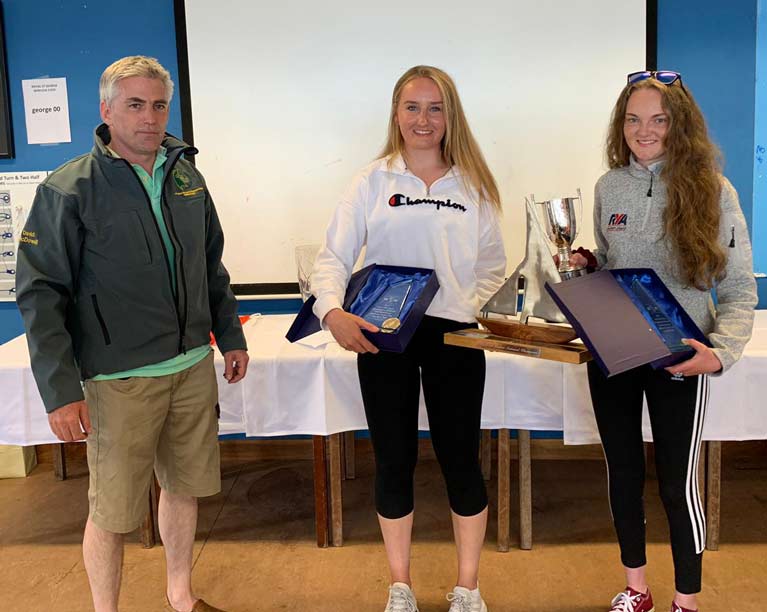 1st Gold Kane and Gallagher
1st Gold Kane and Gallagher
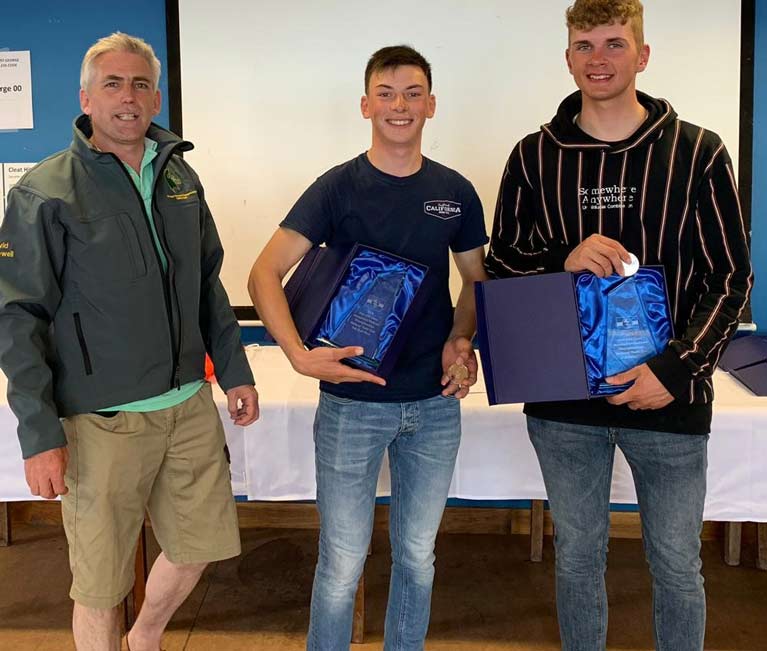 2nd-Gold Lyttle and Whyte
2nd-Gold Lyttle and Whyte
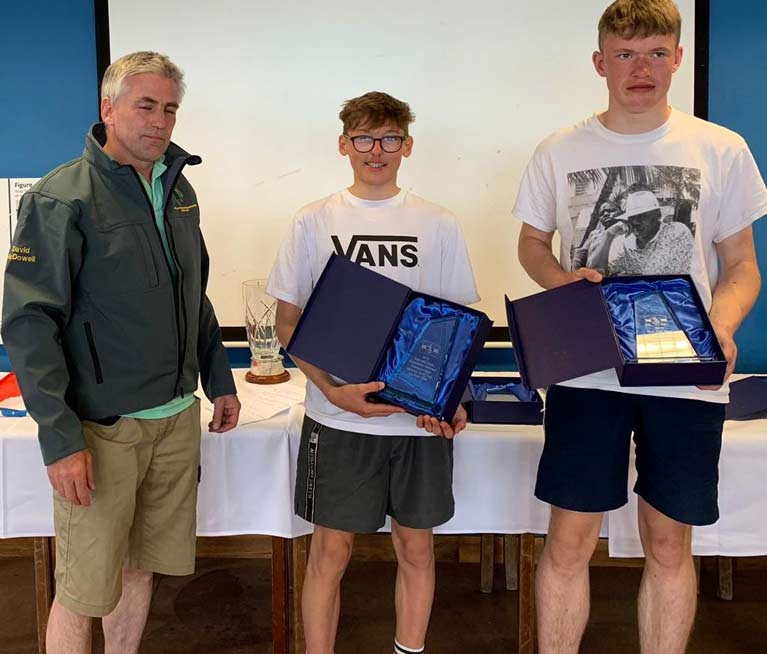 3rd Gold -Davidson-and-Thomson
3rd Gold -Davidson-and-Thomson
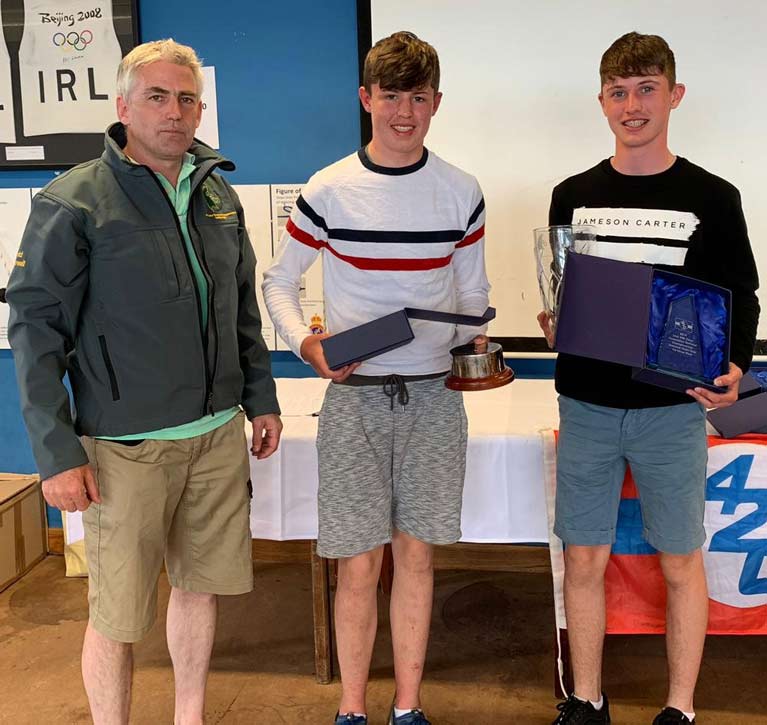 1st Silver -Duffy and Johnston
1st Silver -Duffy and Johnston
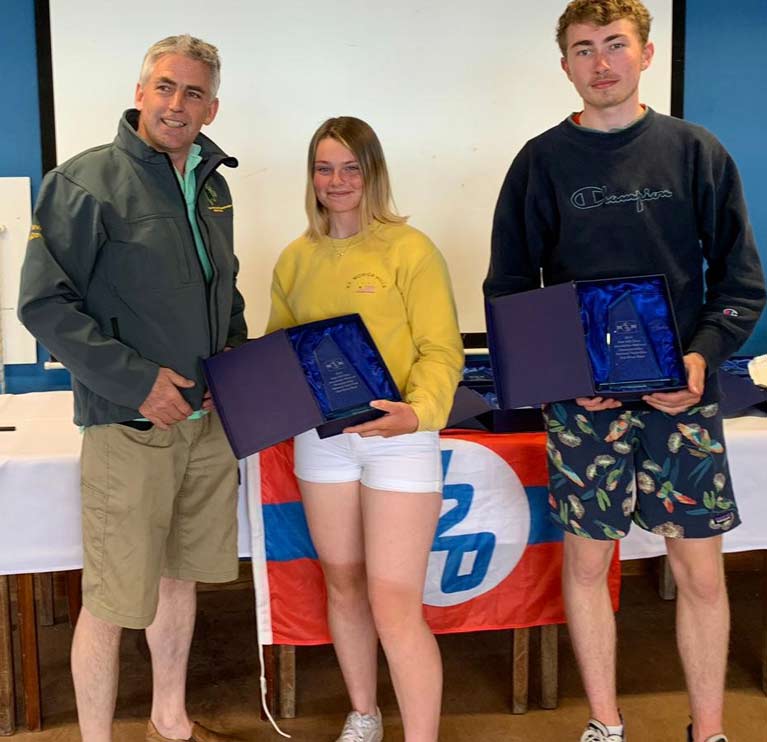 2nd Silver - Mc-Dowell and O'Brien
2nd Silver - Mc-Dowell and O'Brien
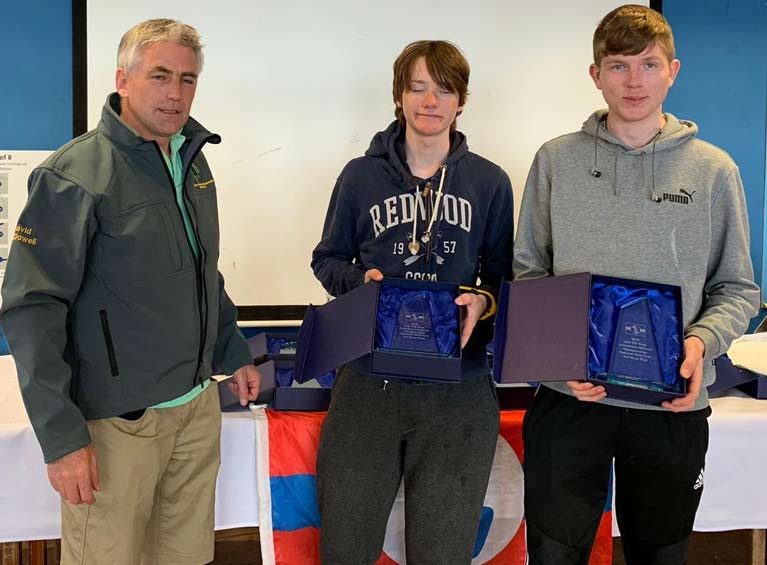 3rd-Silver - Shackelton and Evans
3rd-Silver - Shackelton and Evans
Gold Fleet
1st place – Kane/Gallagher – East Antrim Boat Club/Malahide Yacht Club
2nd place - Lyttle/Whyte – Royal St. George Yacht Club/Lough Ree Yacht Club
3rd place - Davidson/Thomson - Treadudur Bay Sailing Club
Silver Fleet
1st place - Duffy/Johnston – Lough Ree Yacht Club
2nd place - McDowell/O’Brien – Royal North of Ireland Yacht Club/Clontarf Yacht Club
3rd place - Shackelton/Garrett Evans – Howth Yacht Club
420 Girls to the Fore Again at the 2019 Youth Nationals at RCYC
The 2019 Irish Sailing Youth National Championships hosted by Royal Cork Yacht Club provided wild oscillations in weather conditions over the four days of planned racing. Thursday was certainly the calm before the arrival of Storm Hanna and three races for the 420 class were completed in light and fickle conditions. Friday dawned with raceable conditions in the morning but the oncoming storm would have provided little opportunity to get on the water and over to the race area and back again before the onset of the strong winds around lunchtime thereby forcing the cancellation of racing. Saturday looked as if it would provide perfect 420 sailing conditions in the strong breeze at the tail end of the storm but a long postponement eventually saw racing eventually cancelled late in the afternoon.
Sunday dawned with fog and no wind, but the fleet launched at 8:30 in the morning to head out to the race course and they were eventually rewarded with a modest breeze in bright sunshine. The Ferguson sisters from the National Yacht Club provided consistency over the two days of racing with five race wins to retain the title again this year after their win in Dun Laoghaire in 2018. In second place with two race wins were another female crew of Lucy Kane and Emma Gallagher followed by Morgan Lyttle and Patrick White in third position.
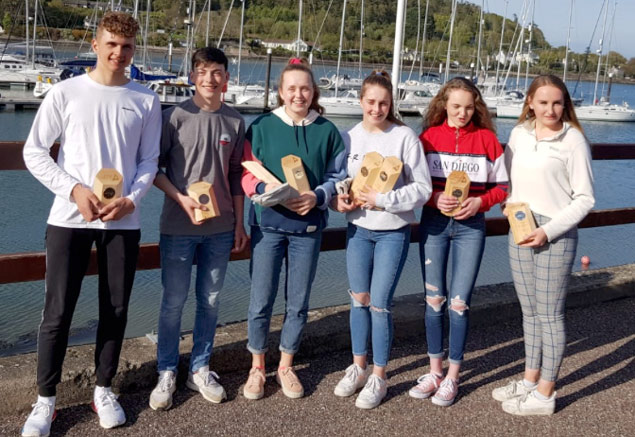 The 420 winning crews at Royal Cork Photo: courtesy Wavelength Images
The 420 winning crews at Royal Cork Photo: courtesy Wavelength Images
The Youth Nationals has traditionally been used by the 420s for team selections to travel to the European or World Championships each year. As Afloat.ie reported earlier here, Nicola and Fiona Ferguson will represent Ireland at the World Championships at Vilamoura in Portugal whilst the qualifiers for the 2019 Junior European Championships at Vilagarcia de Arousa on the North East coast of Spain are as follows:
- Lucy Kane (East Antrim Boat Club) and Emma Gallagher (Malahide Yacht Club)
- Morgan Lyttle Royal (St. George Yacht Club) and Patrick Whyte (Lough Ree Yacht Club)
- Ben Graf and Alexander Farrell (Lough Ree Yacht Club)
Royal Cork Yacht Club and their team of volunteers and race officials are to be congratulated on running a magnificent event under testing weather conditions.
420 Crews Thrive in Spring Conditions at Wexford Harbour
The sunny south-east delivered a fabulous weekend of racing for the 2019 420 Leinster Championships held at Wexford Harbour Boat and Tennis Club. Whilst the forecast for Saturday was pessimistic with regards to the likely wind strength the race management team managed to deliver two quality races in a breeze of up to 7 knots before wrapping it up for the day as the wind died in the early afternoon. Graf and Farrell proved to be the masters of the lighter winds and they led the fleet at the end of day 1.
The change in the hour on Sunday morning combined with an early first gun at 09:25 meant that sailors hit the race course in a building breeze that provided excellent racing with gusts up to 20 knots. Four races were scheduled for the day and the race management team were able to set big courses that allowed for extremely competitive racing with the top positions in the fleet changing throughout the races. Several races were tight with opportunities for a number of boats to take victory in individual races. In the end, the winning crew should a strong determination to win, to battle it out in every single race, to move on from the lows and take opportunities when they arose so that no matter what position they were in during the race they were in the one that counted at the finish line. Lucy Kane and Emma Gallagher took the title with four race wins on the second day of the event ahead of Morgan Lyttle and Patrick Whyte in second and Ben Graf with Alexander Farrell in third.
420 Gold fleet Leinster Champs
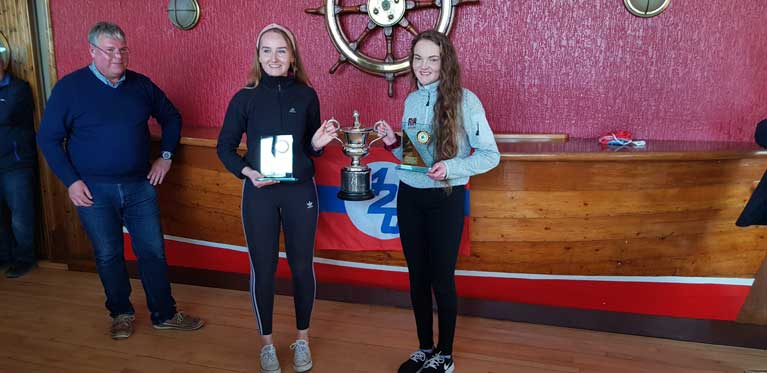 1st Gold fleet
1st Gold fleet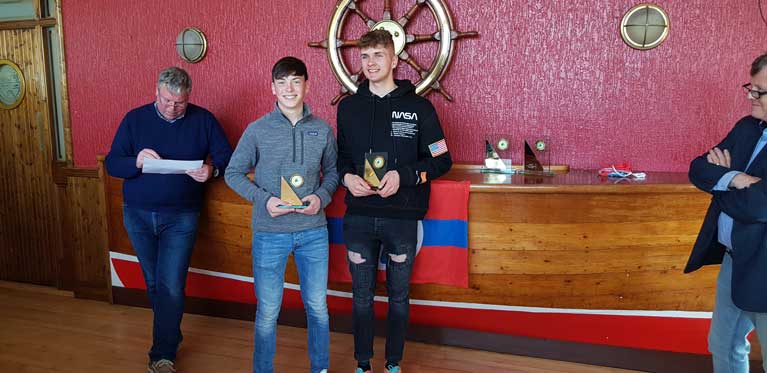 2nd Gold fleet
2nd Gold fleet
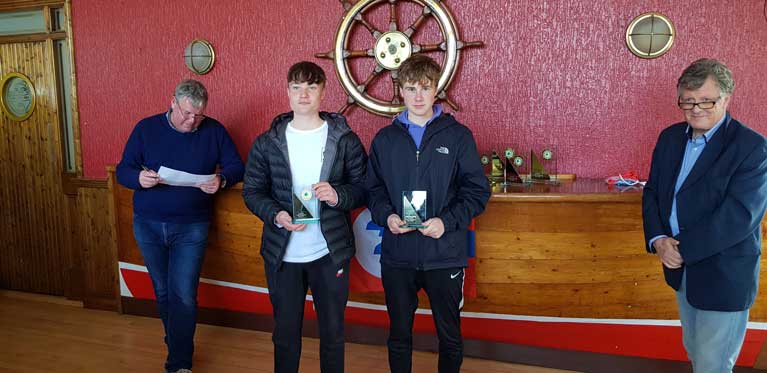 3rd Gold fleet
3rd Gold fleet
1st Gold Fleet – Lucy Kane (East Antrim Boat Club) & Emma Gallagher (Malahide Yacht Club)
2nd Gold Fleet – Morgan Lyttle (Royal St. George Yacht Club) & Patrick Whyte (Lough Ree Yacht Club)
3rd Gold Fleet – Ben Graf (Lough Ree Yacht Club) & Alexander Farrell (Lough Ree Yacht Club)
Silver fleet
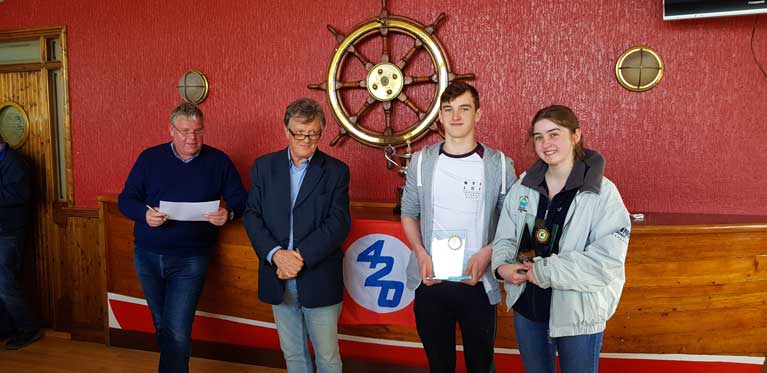 1st Silver fleet
1st Silver fleet
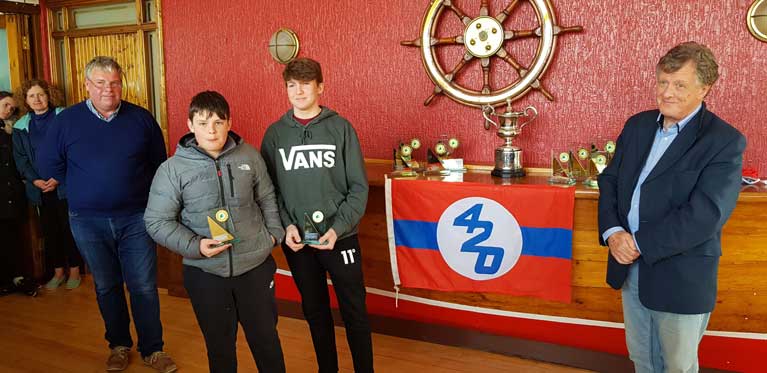 2nd Silver fleet
2nd Silver fleet
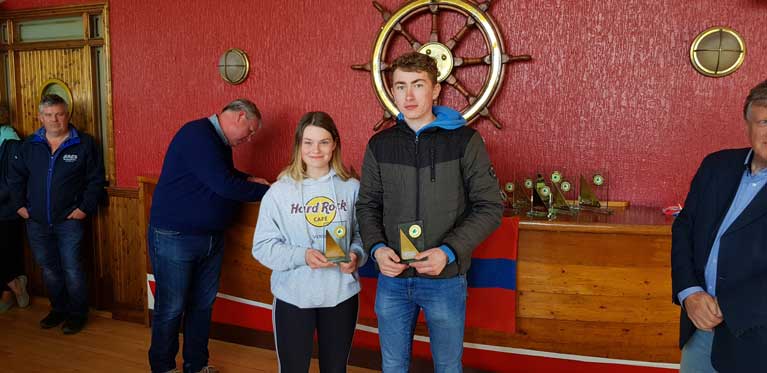 3rd Silver fleet
3rd Silver fleet
1st Silver Fleet – Siofra Collins (Galway Bay Sailing Club) & Rory Collins (Galway Bay Sailing Club)
2nd Silver Fleet – Alex Leech (Lough Ree Yacht Club) & Lughaidh Croasdell (Lough Ree Yacht Club)
3rd Silver Fleet – Lauren McDowell (Royal North of Ireland Yacht Club) & Robert O’Brien (Clontarf Yacht Club)
Lyttle & Whyte Win 420 Munster Champs at Schull
The Schull half term 420 sailing week is the longest of the Irish 420 open training events and the training days are often followed by the Munster Regional Championships as was the case this year.
The four days of training at Schull provided a mixture of on the water and land-based sessions in the purpose-built Fastnet Marine and Outdoor Education Centre. The intensive week is planned out and delivered by experienced coaches with extensive sailing knowledge as well as the skills required to deliver classroom-based sessions to the sailors.
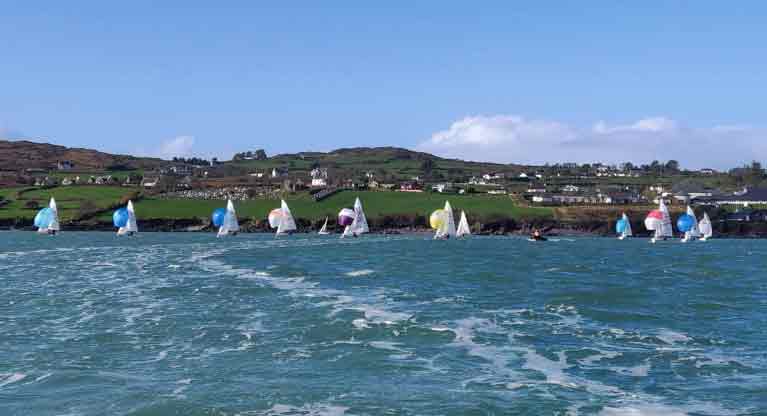 420 sailing at Schull Week 2019
420 sailing at Schull Week 2019
The International 420 has provided the natural pathway for many sailors and choosing the 420 pathway provides sailors with the essential skills they will need whatever their next step in sailing. It is the perfect boat to develop skill in strategy, tactics, boat handling, tuning and technique. Whilst the 420 is accessible and easy to start to sail – it is also a high-performance boat which demands excellent skills to compete at the top level.
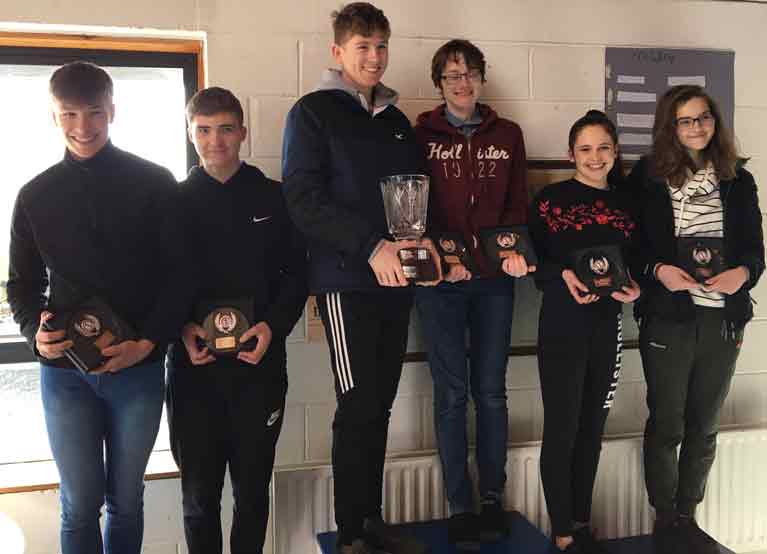 420 Munster Championships Silver Fleet prize winners
420 Munster Championships Silver Fleet prize winners
The week delivered a range of weather with sublime sailing days bookending the week and providing a variety of conditions for sailors to test their skills in between. For some of the more experienced sailors came the opportunity to test their skills in wind speeds up to 25knots and above, which provided scintillating conditions for 420 sailing, especially upwind. The boats are designed to plane easily, yet the hull shape gives a measure of stability. Should a capsize occur, the 420 is safe and easy to right and comes up with little water in it due to its buoyancy lifting the hull out of the water. The controls allowed a variety of crew weights to get maximum speed on the water, as well as enabling sailing in higher wind strengths and in choppy sea states that other dinghies struggle to sail in.
The training days set the sailors up nicely for the 2019 Munster Regional Championships held on the Friday and Saturday. Day 1 of racing on Friday brought very strong winds ranging from 25 to 35 knots so racing was cancelled for the day allowing the sailors time to enjoy some of the sights and scenes of south-west Cork. The winds moderated for Saturday and with all the sailors primed the weather duly delivered an exceptional days racing. With racing held within the bay to avoid the large Atlantic swell, still running after the previous days strong winds, a series of six races were completed. The first three races produced three different winners but as the series progressed the Kane/Gallagher combination showed excellent boat speed and consistency to finish with four race wins. However the eagerness to get out of the traps early in the first race series of the year led to a number of OCS results being carded across the fleet and with Kane/Gallagher picking up two of them, this opened the door for Lyttle/Whyte to take the Championships ahead of Graff and Farrell.
Gold Fleet results
1st Morgan Lyttle (Royal St George Yacht Club) and Patrick Whyte (Lough Ree Yacht Club)
2nd Ben Graff and Alexander Farrell (Lough Ree Yacht Club)
3rd Lucy Kane (East Antrim Boating Club) and Emma Gallagher (Malahide Yacht Club)
Silver Fleet results
1st Harry Shackelton and Christopher Evans Garrett (Howth Yacht Club)
2nd Olivia Cure and Isabella Irwin (Galway Bay Sailing Club)
3rd Andrew Boyle and Ben Patterson (Malahide Yacht Club)
As important as the sailing during Schull week are the opportunities to meet other sailors and parents from a variety of clubs around the country with the sailors holding a dinner at the Schull Harbour Hotel after the first days racing.
420 Crews Train on Lough Ree Ahead of Busy 2019 Summer Sailing Season
Irish 420 sailors have been out testing their skills in the strong breeze on Lough Ree this winter in anticipation of a full calendar of events starting with the first 420 regional championships of 2019 at the Fastnet Marine and Outdoor Training Centre in Schull County Cork in a month's time from February 22nd to 23rd.
420 Sailing on Lough Ree
Last Sunday was a perfect day for a midwinter's morning blast. The Lough Ree 420 sailors took full advantage of the conditions.
Building on the success of its Mirror fleet, Lough Ree Yacht Club are building an active 420 fleet.
With the addition of a trapeze and a good deal more speed, it’s the natural progression for sailors who have already developed double-handed sailing skills.
Former 420 sailor Robert Dickson, who recently won the U23 49er World Championship with Seán Waddilove, has been running coaching weekends to help to develop the class.
In response to parents who have sought guidance on what boat to advance to once their sailors have left Optimists, Lough Ree Yacht Club has mapped out it’s own ‘youth pathway programme’.
Single-handed sailors move from Optimists to Lasers. Mirror sailors progress into the 420. Sailors are encouraged to try both double-handed and single-handed to develop a complete set of sailing skills.
2019 Calendar
As previously reported by Afloat.ie, the fleet then returns to Wexford Harbour Boat and Tennis Club for the 2019 420 Leinster Championships on March 30th.
On April 25th, the 2019 Irish Sailing Youth Pathway Championships will be the selection event for the Team travelling to the 2019 Junior European Championships.
In July, the National Championships will the year be part of the very exciting Volvo Dun Laoghaire Regatta.
The 420 Connacht Championships returns to Galway Bay Sailing Club on August 17.
The Ulster Championships will once again be part of the RYA Northern Ireland Youth Championships on September 21.


























